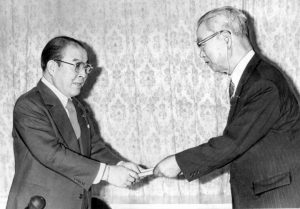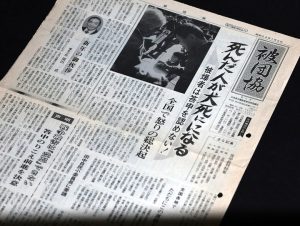Documenting Hiroshima 80 years after A-bombing: December 11, 1980: Report from panel on Fundamental Problems of Measures for Victims of Atomic Bombs
May 5, 2025
“Theory of endurance of sufferings” angers atomic bomb survivors
by Michio Shimotaka, Staff Writer
On December 11, 1980, atomic bomb survivors expressed intense disappointment and anger toward an opinion paper submitted to Minister of Health and Welfare Sunao Sonoda by a panel called the Conference for Fundamental Problems of Measures for the Victims of the Atomic Bombs. The paper advocated the “theory of endurance of sufferings,” which asserted war damages should be borne by citizens equally, and rejected the idea of granting condolence money to those who died due to the atomic bombings or survivor’s pensions.
While the national government provided relief only to surviving atomic bomb victims suffering from radiation-related harm, atomic bomb survivors were demanding national compensation be paid to all victims, including the dead. The December 12, 1980, issue of the Chugoku Shimbun published the words by Ichiro Moritaki, chair of the Hiroshima Prefectural Confederation of A-Bomb Sufferers Organizations. Expressing his frustration at the opinion paper. He said, “Survivors are demanding the government shed light on those who died from the atomic bomb. This is because those who are alive feel a sense of guilt toward those who have died.”
The panel was launched as a private advisory body to the Health Minister in June 1979. Its seven members included Seiji Kaya, chairperson and professor emeritus at the University of Tokyo specializing in physics, and Jiro Tanaka, former Supreme Court judge. They held 14 closed-door discussions.
Government takes cautious attitude
The beginning of this trend was the March 1978 Supreme Court ruling, which was given in favor of Son jin doo, a Korean atomic bomb survivor, who demanded the Fukuoka Prefectural government issue an Atomic Bomb Survivor’s Certificate to him. The court ruled that Mr. Son was entitled to receive the certificate, stating the Medical Relief for Atomic Bomb Victims Law was based on consideration of national reparations by the country that started the war. Following the national government’s policy, the prefectural government argued that support for atomic bomb survivors should be in the framework of the “social security” system.
The following month, the House of Representatives’ social and labor committee noted there was a growing demand for support measures for atomic bomb survivors based on the spirit of national compensation, and decided to reconsider the medical relief law along with the Atomic Bomb Victims Special Measures Law. The government was wary of this trend, as recognizing compensation for atomic bomb damage as due to damage caused by the nation’s act of war would inevitably lead to compensation claims for other war-related damage, such as that caused by air raids.
According to the minutes of the panel that were later disclosed, Ryutaro Hashimoto, the then health minister, said during the first meeting, “We were seriously concerned that if those who suffered harm to life and health due to the atomic bombs, which are special weapons, are entitled to receive national compensation, other general war victims would demand compensation as well.”
In an effort to break the government’s stance, Mr. Moritaki requested support as state compensation during a hearing in Tokyo in December 1979. In April 1980, ten atomic bomb orphans expressed their feelings during a hearing on the circumstances of atomic bomb survivors in Hiroshima,
“Useless deaths”
Initially, some members of the panel were supportive of providing compensation for deaths caused by the atomic bombings, but as the report’s submission date approached, intervention by the health ministry became more noticeable. “We asked them to place various brakes to prevent state compensation from becoming unstoppable,” said the official in charge of the November 1980 meeting.
After all, the report clearly stated that even if citizens were forced to sacrifice their lives or health during wartime, “all citizens must endure the sufferings equally,” based on the theory of endurance of sufferings. However, it also pointed out the effects the atomic bomb radiation had were of a “distinctively special nature” compared to general wartime damage, calling for measures for A-bomb victims without creating “significant disparities” compared to those for other war victims.
The report said the basic principle to carry out these measures was “the perspective of national compensation in a broad sense,” stressing the necessity of measures for those who were believed to have been exposed to high levels of radiation at close range. However, limiting the scope of relief to radiation damage suffered by surviving atomic bomb victims was only a confirmation of previous measures.
On the day the report was made public, the Japan Confederation of A- and H-Bomb Sufferers Organizations (Nihon Hidankyo) advanced an opinion stating the report evaded the state’s responsibility for the war and failed to criticize the atomic bombings. On January 6, 1981, the group’s newspaper strongly opposed the report, saying, “It makes the victims’ deaths useless.” Nihon Hidankyo continued to call on the national government to expand compensation for other war victims as well.
(Originally published on May 5, 2025)









